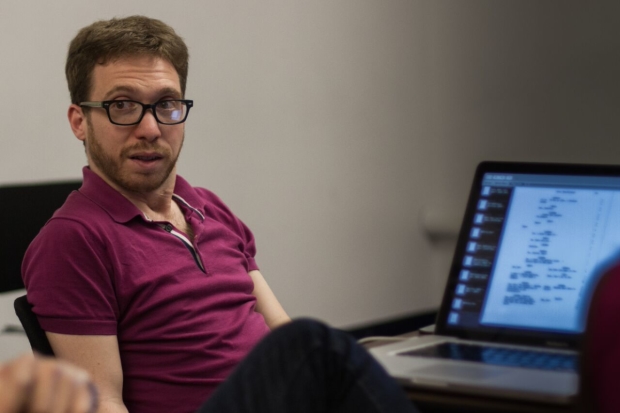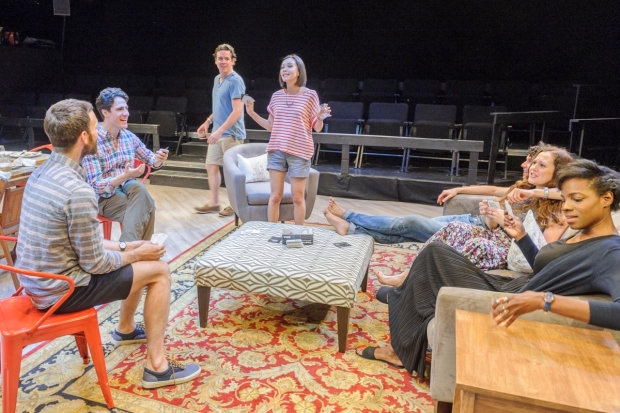Michael Perlman Explores the Way the World Is Changing in His New Play, At the Table
Perlman is the GLAAD Award-winning author of the acclaimed ”From White Plains”.
"What happens to us in a changing world when those in the center of the conversation are really on the periphery, and those in the minority suddenly find themselves at the center of the dialogue?" That's the question at hand in At the Table a new play from GLAAD Award-winning dramatist Michael Perlman. Running at HERE through July 19 in a production Perlman directs for Fault Line Theatre, the work finds a group of friends seated around a dinner table, engaging in a tense discussion about some very sensitive and emotional subjects.
For Perlman, the author of the acclaimed drama From White Plains, it was the chance not to explore societal taboos, but as a way to examine the way people today have conversations. He shared with TheaterMania his thoughts on how "the cultural tide is changing," why plays that go for the gut aren't really getting produced, and what goes into making a play set around a dinner table exciting.

(© John Racioppo)
Tell me about the origins of this play. Where did it come from?
After the success of From White Plains, Aaron and Craig, the co-artistic directors of Fault Line Theatre, and I wanted to do another show together. I was curious about the ways in which conversations are happening in America, and the ways in which the culture is changing. Being in my thirties, I’m looking around at myself and my friends and seeing that we are at the point in our lives where we are realizing we have to make decisions about who we’re going to be in the world — how we're going to interact and what we're going to care about. The country as a whole in a similar place — as we face a moment when the cultural tide is changing and the straight white man is no longer at the center of every conversation, how will we as a country respond and grow? The challenge, of course, was making that about actual people.
How many "taboo" subjects would you say you cover in this play, and which one, as a writer, proved the most potent in terms of dialogue?
I never thought of this play as a play about "taboo" subjects, so that’s difficult to answer. It's a play about how to have conversations, so of course difficult topics are useful in exploring that. For me, what was most exciting as a writer was when characters started having conversations with themselves — when one character questions her own place in her group of friends and in the world as a black woman, that was the both easiest and most difficult to write.
Is this play a response to the fact that theater today seems very easy to swallow?
I think everybody who makes theater is attempting to go for the heart, mind, and gut. So if we don't always succeed, I don't think it's because the artists aren't going for them. I think there's a lot of fear of going there. Will we get produced? Will audiences come? What will critics say? What do I have to say about this topic? What happens when we reveal the worst parts of ourselves to the world? But we're always trying to, and I believe everybody who makes theater or any kind of art is always trying to do these things.
As director, how do you make a series of conversations around a dinner table dramatically compelling?
I try to create as much variety as possible. And make sure that we're tracking everybody's different experiences of the conversations. Who is quiet, and how do we draw the audience's attention to that person for a moment? Who gets up and removes him or herself from the conversation? Who dives right into the center of every conversation? Who asks questions? Who always has an answer? Who can't get a word in? It's about making sure that the conversations themselves are about the characters and the questions being raised, not just about the topics themselves. There's a whole lot more going on than the words, and that's always true. It's a matter of using the same principles I would when directing a big crowd scene with lots of action to a smaller scene around a table.
As writer, what do you want the audience to take away after having seen the play? As director, are your goals different? Do they change from medium to medium?
I want the audience to leave ready to engage with their own lives. I hope that they have questions about the ways in which they engage in conversation, the ways in which they judge themselves and others, and the ways in which the world works. And they begin to ask those questions, of themselves and of others, in order to begin more conversation. Ideally the end of this play is the beginning of a much longer conversation. As a director, I want the same thing, and want it for every piece I work on.

(photo courtesy of the production)








